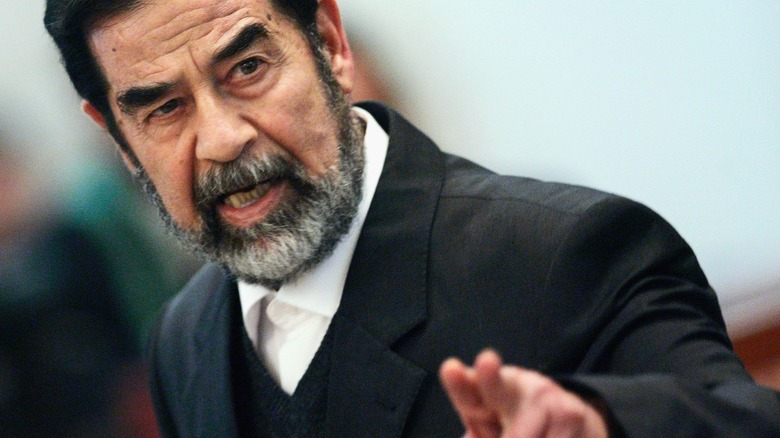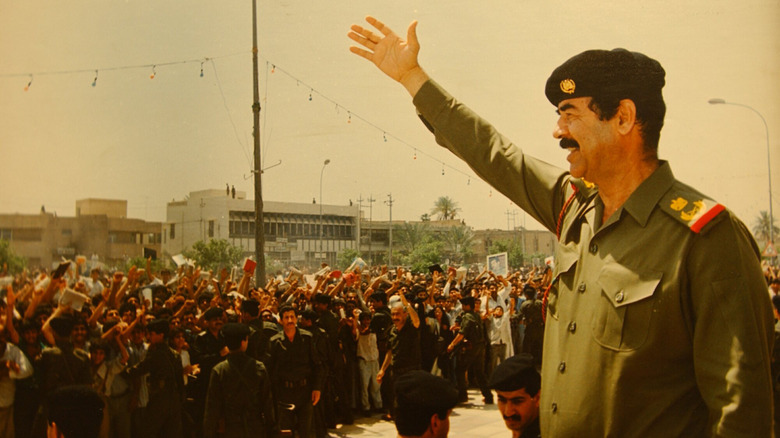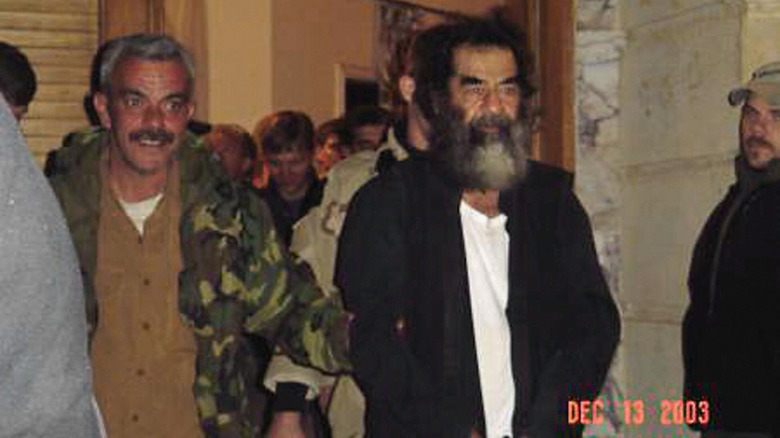How Much Was The Bounty On Saddam Hussein?
Those not currently living in the American Old West might be surprised to learn that yes, bounty hunters actually exist in real life. In days of far less rigorous law enforcement — going all the way back to 13th century England — it was helpful to have hired guns to capture fugitives or to make sure folks don't skip bail. Bounty laws are varied, sticky, not universal across countries or even states within countries (like the U.S.), and require a lot more book learning and licensing than you might expect. But if you get lucky, you might have the chance to hunt down a notorious dictator wanted for millions, like the late Saddam Hussein.
For those not alive from the late 1970s to the mid-2000s, Hussein was a brutal, repressive tyrant who tortured and murdered thousands of Iraqi Shiʿis and Kurds. To some Arab peoples outside of Iraq, he was a valiant rebel who snubbed the meddlesome powers of the West. On paper, he was simply president of Iraq from 1979 to 2003. And to the American military, he was a threat who harbored weapons of mass destruction in the days following the 9/11 terrorist attacks on the World Trade Center in New York City.
But to bounty hunters, Hussein was a target worth $25 million, the same amount placed on the head of Al Qaeda leader, Osama bin Laden. Nobody wound up getting the bounty, though, as the person who led authorities to Hussein did so under interrogation.
The 'Ace of Spades' in a 55-person bounty list
While governments and private businesses can both offer bounties, Saddam Hussein's $25 million bounty came directly from the United States government. It was the largest bounty offered for a single person, matched by the bounties on Osama bin Laden, bin Laden's Al Qaeda successor, Ayman al-Zawahiri who was killed by a U.S. drone strike in 2022, and former successor Abu Mus'ab al-Zarqawi, who died in a U.S. airstrike in 2006.
As the BBC explains, Hussein was part of a 55-person group of "the most-wanted members of the former Iraqi regime" targeted by the U.S. government. And since 55 is close to the number of cards in a standard deck, Saddam Hussein got labeled the "Ace of Spades," i.e., a top target. His two sons, the elder Uday and the younger Qusay Hussein, were included on the list with a bounty of $15 million each. As Time explained in 2014, Uday was too "psychopathic" even for Hussein, and so Hussein intended to pass along his dictatorship to Qusay, who also played a role in Iraqi intelligence and weapons programs.
Per CNN, both of Hussein's sons were dead by December 2003, and their collective $30 million bounty was paid out to an unnamed informant who led authorities to the sons' locations. Both men, along with two others, were killed in a "fierce gun battle" with U.S. forces (via the U.S. Air Force), and the bounty for both was paid out, which sheds light on bounty requirements: Namely, the informant fulfilled his part by willingly disclosing the sons' locations, no matter what else happened. He didn't have to play the Hollywood vigilante, either.
Hussein's unpaid bounty
With Saddam Hussein's sons out of the way, there was nothing left to do in 2003 but track down Hussein himself. U.S. forces broke his regime within weeks of invading Iraq on March 30, 2003, but it took the rest of the year to locate Hussein himself. To attempt to find Hussein, CNN said that U.S. forces interrogated "about five to 10" members of families from Tikriti, Iraq, Hussein's hometown and suspected hiding spot. These individuals included Hussein's bodyguards, including the "Fat Man," Mohammed Ibrahim Omar al-Musslit.
As the BBC says, al-Musslit is the one who gave away Hussein's location. Hussein was quite literally hunkering down in a hole in the ground on a farm in Tikriti covered by a big rock, as an actual picture of the location on the Defense Intelligence Agency website shows. Thus we get the famous, long-bearded and bedraggled pictures of Hussein getting led away from the farm by military personnel. Hussein was put on trial for a laundry list of crimes against humanity and hanged to death in 2006.
As for the $25 million bounty, al-Musslit never saw it. Yes, he gave away Hussein's location, but not willingly. He'd been arrested and interrogated — which could mean tortured in the post-9/11 "enhanced interrogation" kind of way. That the information was coerced disqualified him from receiving the bounty. In 2004 NBC News quoted U.S. Army Major-General Raymond Odierno as saying, "The U.S. Treasury gets to keep the money."


